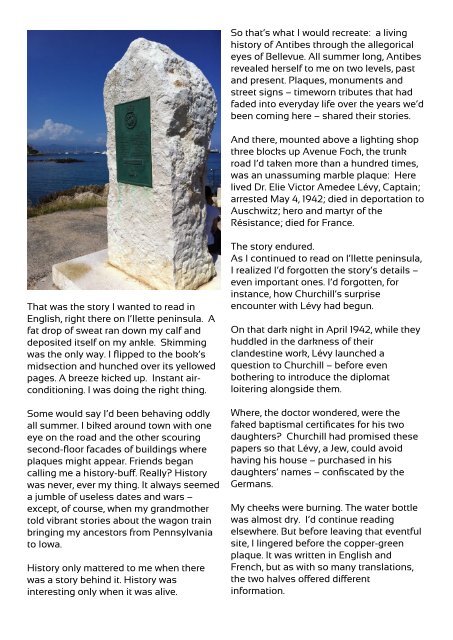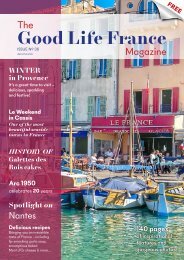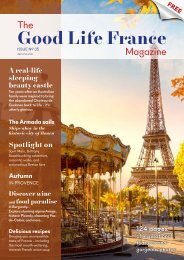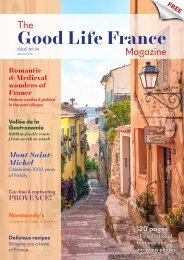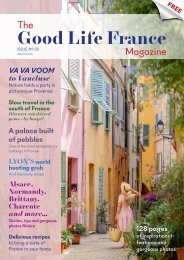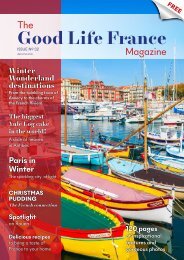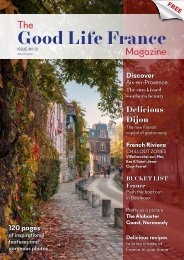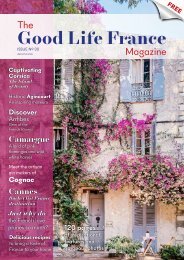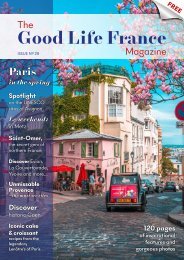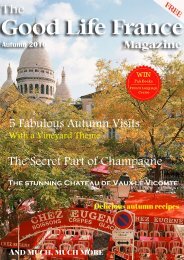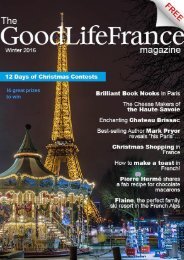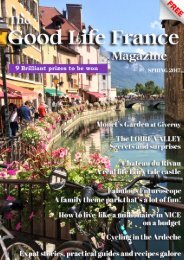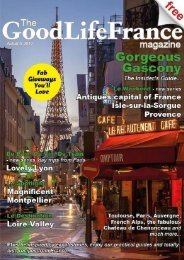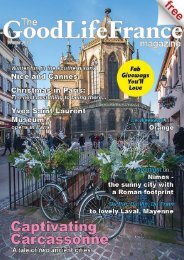Issue No. 15
Discover the Drome, Nyons - the last Provencal frontier, Charente-Maritime, Burgundy, Paris gastronomy, Nice, secret Provence, recipes, a whole lot more. It's the next best thing to being in France...
Discover the Drome, Nyons - the last Provencal frontier, Charente-Maritime, Burgundy, Paris gastronomy, Nice, secret Provence, recipes, a whole lot more. It's the next best thing to being in France...
- No tags were found...
Create successful ePaper yourself
Turn your PDF publications into a flip-book with our unique Google optimized e-Paper software.
So that’s what I would recreate: a living<br />
history of Antibes through the allegorical<br />
eyes of Bellevue. All summer long, Antibes<br />
revealed herself to me on two levels, past<br />
and present. Plaques, monuments and<br />
street signs – timeworn tributes that had<br />
faded into everyday life over the years we’d<br />
been coming here – shared their stories.<br />
And there, mounted above a lighting shop<br />
three blocks up Avenue Foch, the trunk<br />
road I’d taken more than a hundred times,<br />
was an unassuming marble plaque: Here<br />
lived Dr. Elie Victor Amedee Lévy, Captain;<br />
arrested May 4, 1942; died in deportation to<br />
Auschwitz; hero and martyr of the<br />
Résistance; died for France.<br />
That was the story I wanted to read in<br />
English, right there on l’Ilette peninsula. A<br />
fat drop of sweat ran down my calf and<br />
deposited itself on my ankle. Skimming<br />
was the only way. I flipped to the book’s<br />
midsection and hunched over its yellowed<br />
pages. A breeze kicked up. Instant airconditioning.<br />
I was doing the right thing.<br />
Some would say I’d been behaving oddly<br />
all summer. I biked around town with one<br />
eye on the road and the other scouring<br />
second-floor facades of buildings where<br />
plaques might appear. Friends began<br />
calling me a history-buff. Really? History<br />
was never, ever my thing. It always seemed<br />
a jumble of useless dates and wars –<br />
except, of course, when my grandmother<br />
told vibrant stories about the wagon train<br />
bringing my ancestors from Pennsylvania<br />
to Iowa.<br />
History only mattered to me when there<br />
was a story behind it. History was<br />
interesting only when it was alive.<br />
The story endured.<br />
As I continued to read on l’Ilette peninsula,<br />
I realized I’d forgotten the story’s details –<br />
even important ones. I’d forgotten, for<br />
instance, how Churchill’s surprise<br />
encounter with Lévy had begun.<br />
On that dark night in April 1942, while they<br />
huddled in the darkness of their<br />
clandestine work, Lévy launched a<br />
question to Churchill – before even<br />
bothering to introduce the diplomat<br />
loitering alongside them.<br />
Where, the doctor wondered, were the<br />
faked baptismal certificates for his two<br />
daughters? Churchill had promised these<br />
papers so that Lévy, a Jew, could avoid<br />
having his house – purchased in his<br />
daughters’ names – confiscated by the<br />
Germans.<br />
My cheeks were burning. The water bottle<br />
was almost dry. I’d continue reading<br />
elsewhere. But before leaving that eventful<br />
site, I lingered before the copper-green<br />
plaque. It was written in English and<br />
French, but as with so many translations,<br />
the two halves offered different<br />
information.


